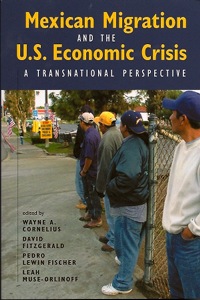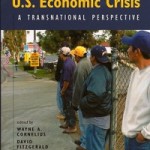Researchers examine Mexico United States border migration flow
Posted by Elena del Valle on April 9, 2010

Mexican Migration and the U.S. Economic Crisis
In the past couple of years, traffic of undocumented immigrants across the Mexico United States border has declined (see Fewer Mexican immigrants arriving, similar number returning home). Thirty-five researchers participating in the Mexican Migration Field Research and Training Program (MMFRP) based in the Center for Comparative Immigration Studies at the University of California, San Diego, and in partnership with Mexican institutions, contributed a summary of their findings on recent migration from Mexico to the United States. Their work, edited by Wayne A. Cornelius, David Fitzgerald, Pedro Lewin Fischer and Leah Muse-Orlinoff, was published this year as a book titled Mexican Migration and the U.S. Economic Crisis A Transnational Perspective (Center for Comparative Immigration Studies, $29.50).
The researchers set out to better understand how economic shocks affect populations movements, specifically those across the Mexico to United States border. They were curious to know how people were managing in places that provided or received immigrants; how individuals were making decision about migrating, staying at home or staying in the United States; and the importance of U.S. immigration enforcement at the border and within the United States in discouraging immigration and encouraging the settling of immigrants in the United States.
The 269-page softcover book is divided into 10 chapters: Introduction; Coping with La Crisis; Double Jeopardy: How U.S. Enforcement Policies Shape Tunkaseño Migration; Economic Crisis vs. Border Enforcement: What Matters Most to Prospective Migrants?; Inhabiting Two Worlds: Tunkaseños in the Transnational Labor Market; Leaving to Learn or Learning to Leave: Education in Tunkás; Values in Conflict: Youth in A Culture of Migration; The Family Dynamics of Tunkaseño Migration; Sweet Dreams and Bitter Realities: Nutrition and Health Care in Tunkás and the United States; and Reshaping Community Participation: Tunkaseños in a Binational Context.

Wayne A. Cornelius, director emeritus, Center for Comparative Immigration Studies (CCIS)
Cornelius is director emeritus, Center for Comparative Immigration Studies (CCIS), University of California-San Diego as well as Distinguished Professor of Political Science. Fitzgerald, associated director, CCIS is author of A Nation of Emigrants: How Mexico Manages Its Migration. Lewin Fischer is senior researcher at the Instituto Nacional de Antropologia e Historia’s Centro Yucatán. Leah Muse-Orlinoff is a Ph.D. candidate in sociology at the University of California, San Diego.

Click here to buy Mexican Migration and the U.S. Economic Crisis









